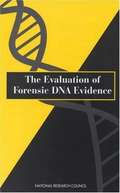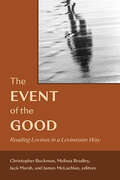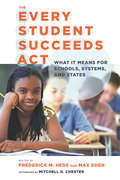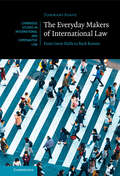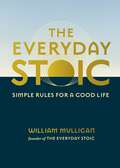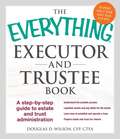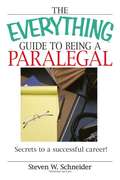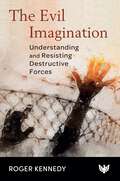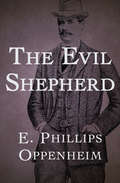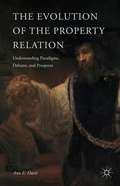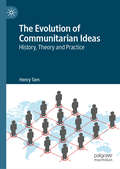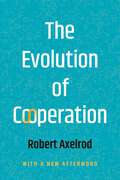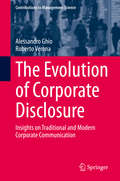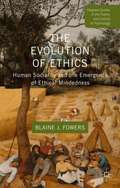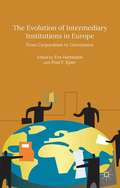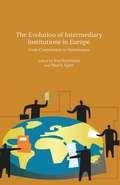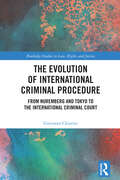- Table View
- List View
The Evaluation of Forensic DNA Evidence
by Committee on DNA Forensic Science: An UpdateIn 1992 the National Research Council issued DNA Technology in Forensic Science, a book that documented the state of the art in this emerging field. Recently, this volume was brought to worldwide attention in the murder trial of celebrity O. J. Simpson. The Evaluation of Forensic DNA Evidence reports on developments in population genetics and statistics since the original volume was published. The committee comments on statements in the original book that proved controversial or that have been misapplied in the courts. This volume offers recommendations for handling DNA samples, performing calculations, and other aspects of using DNA as a forensic tool--modifying some recommendations presented in the 1992 volume. The update addresses two major areas: Determination of DNA profiles. The committee considers how laboratory errors (particularly false matches) can arise, how errors might be reduced, and how to take into account the fact that the error rate can never be reduced to zero. Interpretation of a finding that the DNA profile of a suspect or victim matches the evidence DNA. The committee addresses controversies in population genetics, exploring the problems that arise from the mixture of groups and subgroups in the American population and how this substructure can be accounted for in calculating frequencies. This volume examines statistical issues in interpreting frequencies as probabilities, including adjustments when a suspect is found through a database search. The committee includes a detailed discussion of what its recommendations would mean in the courtroom, with numerous case citations. By resolving several remaining issues in the evaluation of this increasingly important area of forensic evidence, this technical update will be important to forensic scientists and population geneticists--and helpful to attorneys, judges, and others who need to understand DNA and the law. Anyone working in laboratories and in the courts or anyone studying this issue should own this book.
The Evangelical Origins of the Living Constitution
by John W. ComptonThe New Deal is often said to represent a sea change in American constitutional history, overturning a century of precedent to permit an expanded federal government, increased regulation of the economy, and eroded property protections. John Compton offers a surprising revision of this familiar narrative, showing that nineteenth-century evangelical Protestants, not New Deal reformers, paved the way for the most important constitutional developments of the twentieth century. Following the great religious revivals of the early 1800s, American evangelicals embarked on a crusade to eradicate immorality from national life by destroying the property that made it possible. Their cause represented a direct challenge to founding-era legal protections of sinful practices such as slavery, lottery gambling, and buying and selling liquor. Although evangelicals urged the judiciary to bend the rules of constitutional adjudication on behalf of moral reform, antebellum judges usually resisted their overtures. But after the Civil War, American jurists increasingly acquiesced in the destruction of property on moral grounds. In the early twentieth century, Oliver Wendell Holmes and other critics of laissez-faire constitutionalism used the judiciary's acceptance of evangelical moral values to demonstrate that conceptions of property rights and federalism were fluid, socially constructed, and subject to modification by democratic majorities. The result was a progressive constitutional regime--rooted in evangelical Protestantism--that would hold sway for the rest of the twentieth century.
The Event of the Good: Reading Levinas in a Levinasian Way
by Christopher Buckman; Melissa Bradley; Jack Marsh; James McLachlanCenters on the ethics of Emmanuel Levinas, aiming to understand this important thinker on his own terms.To read Levinas in a Levinasian way means to understand this important thinker on his own terms, thinking "ethics as first philosophy," without reducing his role to that of a contributor to some other discourse, such as phenomenology, deconstruction, or religious traditions other than his own. This volume offers a variety of interventions into how the priority of the ethical-as formulated by Emmanuel Levinas and seconded by Richard A. Cohen, one of his preeminent interpreters-reorients philosophy to its own questioning-indeed, to its very sense of itself as meaningful. In the decades since Levinas first emerged as a profound and critical voice, many have used his thought to illuminate a broad range of philosophical questions. Often this has occurred in ways that have deemphasized or altered what is arguably Levinas's most radical gesture: reframing philosophy, indeed reframing the meaning of meaning, via an ethical turn. To this end, the essays in this volume, drawing especially on Cohen's reading of Levinas, offer insights into how appropriations and assessments of his philosophy might become more in line with the urgency and full meaning of his notion of the ethical. Whether discussing ethics, aesthetics, politics, or Jewish thought, when taken together, they enhance our comprehension of ethics and Levinas's philosophy of responsibility.
The Every Student Succeeds Act: What It Means for Schools, Systems, and States (Educational Innovations Series)
by Frederick M. Hess and Max EdenIn this foundational book, Frederick M. Hess and Max Eden bring together a cross-section of respected academics and journalists to examine key aspects of the Every Student Succeeds Act (ESSA). This volume provides a thematic and in-depth analysis of the central provisions of this landmark legislation, presenting a range of perspectives. The contributors—leading researchers, policy analysts, and journalists—explore the conflicts and compromises that shaped the emerging law, outline its core provisions, and trace its implications for urban districts, states, and the federal government. Complementing these descriptions are chapters presenting opposing viewpoints on the law&’s merits and its ramifications for future reform efforts. Enacted in December 2015, ESSA represents a major shift of the federal role in education, and its provisions touch on almost every aspect of education policy. Yet it arrived in something of a whirlwind, and scholars, advocates, and policy makers are struggling to make sense of this new act. By bringing together leading thinkers to make sense of this important law, The Every Student Succeeds Act provides a solid foundation for scholars, advocates, and policy makers as they begin to navigate a new era in education policy.
The Everyday Makers of International Law: From Great Halls to Back Rooms (Cambridge Studies in International and Comparative Law)
by Tommaso SoaveThis book offers a unique insight into the inner workings of international courts and tribunals. Combining the rigour of the essay and the creativity of the novel, Tommaso Soave narrates the invisible practices and interactions that make up the dispute settlement process, from the filing of the initial complaint to the issuance of the final decision. At each step, the book unravels the myriad activities of the legal experts running the international judiciary – judges, arbitrators, agents, counsel, advisors, bureaucrats, and specialized academics – and reveals their pervasive power in the process. The cooperation and competition among these inner circles of professionals lie at the heart of international judicial decisions. By shedding light on these social dynamics, Soave takes the reader on a journey through the lives, ambitions, and preoccupations of the everyday makers of international law.
The Everyday Stoic: Simple Rules for a Good Life
by William MulliganNavigate the obstacles of contemporary life and find happiness by following in the footsteps of the classical tradition of Stoicism in this empowering and accessible book written by the founder of the popular The Everyday Stoic account. William Mulligan, founder of The Everyday Stoic, transforms principles from ancient Stoic philosophy into a contemporary guide for overcoming the challenges of modern life and cultivating an unshakeable sense of inner calm, so that you too can live like a Stoic. Rediscover ancient wisdom and join the Stoic movement: From Marcus Aurelius to Seneca, the Stoics have a long and rich history. The Everyday Stoic draws on these timeless teachings and offers a chance to be part of a growing stoic community. Inside you'll discover how to: Cultivate Resilience: With practical tips and actionable advice, this is the perfect guide for anyone looking to gain resilience and overcome adversity, no matter what modern life throws their way. Follow Simple Rules for a Good Life: Explore key concepts such as confronting life's unpredictability and how thoughts create reality, which will empower you to not only be comfortable in the face of adversity but also to thrive. Boost Your Mental Health: Taking the lessons of Stoic Philosophy and applying them to your life can have positive effects on mental health, teaching you how to transform your mindset and shift how you perceive life's obstacles. Channel Ancient Greek and Ancient Roman thoughts and teachings in this accessible, life-transforming guide to making a better, calmer, and less stressed life.
The Everything Executor and Trustee Book: A Step-by-Step Guide to Estate and Trust Administration (The Everything Books)
by Douglas D WilsonEssential information for executors or trustees for wills and trusts!Being appointed the task of carrying out the terms of a will or trust is daunting, especially if it's your first time. The good news is you won't have to figure it out alone. Certified Trust and Financial Advisor Douglas D. Wilson takes the worry out of the process and provides information on important responsibilities that must be performed after a loved one dies. This all-in-one guide includes information on:Filing a will in courtHiring a lawyer or doing it yourselfNotifying beneficiariesFinding and managing the deceased's assetsPaying outstanding debts or taxesYou'll even find sample tax forms and step-by-step walk-throughs of what you'll need to know when overseeing asset distribution, terminating existing accounts, opening an estate bank account, and closing the estate. No matter your experience level, The Everything Executor and Trustee Book will be there to help you every step of the way!
The Everything Guide To Being A Paralegal: Winning Secrets to a Successful Career!
by Steven SchneiderThe Everything Guide to Being a Paralegal is the ideal handbook for new paralegals, professionals looking to further or reevaluate their careers, or those considering the profession.Tackling the concerns of real law professionals, chapters include:Paralegal Career OptionsParalegal Ethics and Professional ResponsibilityPre-Trial PreparationIndividual chapter attention to the top types of law practiceMore and more people are opting for a career as a paralegal-and this book is their pathway to success in this growing field!
The Everything Inventions And Patents Book
by Mary Russell Sarao Barbara Russell PittsThe Everything Inventions and Patents Book is your step-by-step guide to turning your bright idea into a lucrative enterprise. Authored by two successful inventors and businesswomen, this guide shows you how to make your brainchild profitable! With information on everything from protecting your idea, to learning whom you can trust, The Everything Inventions and Patents Book sets you on the right path toward turning your wildest dreams into tangible, patented reality!Includes vital tips on:Patent law Sales and marketingDeveloping your idea into a workable planFilling out a patent applicationGetting your invention off the ground floorThe Everything Inventions and Patents Book is the only resource you need for creating and protecting your idea, your investment, and your future.
The Everything Inventions And Patents Book: Turn Your Crazy Ideas into Money-making Machines!
by Barbara Russell PittsThe Everything Inventions and Patents Book is your step-by-step guide to turning your bright idea into a lucrative enterprise. Authored by two successful inventors and businesswomen, this guide shows you how to make your brainchild profitable! With information on everything from protecting your idea, to learning whom you can trust, The Everything Inventions and Patents Book sets you on the right path toward turning your wildest dreams into tangible, patented reality!Includes vital tips on:Patent law Sales and marketingDeveloping your idea into a workable planFilling out a patent applicationGetting your invention off the ground floorThe Everything Inventions and Patents Book is the only resource you need for creating and protecting your idea, your investment, and your future.
The Everything Wills & Estate Planning Book: Professional advice to safeguard your assests and provide security for your family
by Deborah S LaytonMost Americans donÆt have a will. They avoid estate planning because they donÆt want to think about death or they think itÆs too complicated. But this easy-to-follow guide takes the mystery out of the process. This book shows readers how easy it can be to plan for security and peace of mind. Readers learn how to write a will, create an estate plan, designate executors, choose trusts, reduce tax liabilities, and distribute their assets. Other features include:A glossary of legal termsAdvice for protecting families from creditorsGuidance for unmarried partnersThe important role of charitable giving in your estate planThis book provides sound advice for planning retirement and managing assets at any age and income level. It also includes completely new information on:Updated tax, IRA, and Roth detailsCharitable giving opportunities for reducing taxes and leaving a legacyInstruction for keeping plans up to date as the readers ageAn estate planning checklist
The Everything Wills and Estate Planning Book
by Deborah S LaytonMost Americans don't have a will. They avoid estate planning because they don't want to think about death or they think it's too complicated. But this easy-to-follow guide takes the mystery out of the process. This book shows readers how easy it can be to plan for security and peace of mind. Readers learn how to write a will, create an estate plan, designate executors, choose trusts, reduce tax liabilities, and distribute their assets. Other features include:A glossary of legal termsAdvice for protecting families from creditorsGuidance for unmarried partnersThe important role of charitable giving in your estate planThis book provides sound advice for planning retirement and managing assets at any age and income level. It also includes completely new information on:Updated tax, IRA, and Roth detailsCharitable giving opportunities for reducing taxes and leaving a legacyInstruction for keeping plans up to date as the readers ageAn estate planning checklist
The Everything® Wills & Estate Planning Book
by Deborah S. LaytonMost Americans don't have a will. They avoid estate planning because they don't want to think about death or they think it's too complicated. But this easy-to-follow guide takes the mystery out of the process. This book shows readers how easy it can be to plan for security and peace of mind. Readers learn how to write a will, create an estate plan, designate executors, choose trusts, reduce tax liabilities, and distribute their assets. Other features include: A glossary of legal terms Advice for protecting families from creditors Guidance for unmarried partners The important role of charitable giving in your estate plan This book provides sound advice for planning retirement and managing assets at any age and income level. It also includes completely new information on: Updated tax, IRA, and Roth details Charitable giving opportunities for reducing taxes and leaving a legacy Instruction for keeping plans up to date as the readers age An estate planning checklist
The Evil Imagination: Understanding and Resisting Destructive Forces
by Roger KennedyRoger Kennedy has written a masterful investigation into the concept of evil. He begins with a general view of the subject before moving into more detailed analysis. First is a review of the science of evil, including evidence from neuroscience and social psychology. This is followed by psychoanalytical studies of the individual and groups before presenting an overview of the philosophy of evil. Also included are historical and social studies which inform an understanding of evil in action. Kennedy goes on to examine the nature of genocide using a main focus on the Holocaust and of slavery. Both of these "journeys to evil" remain relevant for understanding contemporary society and issues. The Nazi past continues to disturb and resonate decades on. The politics and social fabric of Western society was reliant on slavery as a foundation of economic wealth and is haunted by its inability to process the harsh reality of slavery and its continuing after-effects. Kennedy moves from there to a discussion on the genius of Shakespeare and his encapsulation of the essential features of how evil can develop and take over a person's inner world. The book concludes with a summary of the main themes and a look at those who have resisted evil and what we can learn from them if we are to build a society that can resist the forces of evil. The book is informed by a psychoanalytic approach, with its emphasis on the power and influence of unconscious processes underlying human actions, and on the role of inner conflicting and elemental fears and anxieties often driving individual and group behaviours. It brings fresh insight to an eternal discourse.
The Evil Shepherd
by E. Phillips OppenheimA former defense attorney turned righteous crusader is the hero of this blockbuster novel from an early master of the thriller genre A businessman is found stabbed through the heart, the obvious suspect his partner: Oliver Hilditch, a cold-eyed fellow with a paper-thin alibi. Hilditch seems destined for the gallows, but he is saved by brilliant defense attorney Francis Ledsam, who uses every legal trick he knows to free his client. It is a defense to be proud of, but Ledsam&’s joy vanishes when Hilditch&’s wife informs him that her husband is guilty of crimes far more monstrous than murder. His faith in his career shaken, Ledsam vows never again to defend a guilty man. But when his newfound principles run up against the harsh reality of real-world justice, he finds himself trapped between his love for a beautiful woman and a powerful desire to do the right thing—no matter the cost. This ebook has been professionally proofread to ensure accuracy and readability on all devices.
The Evolution Of The Property Relation
by Ann E. DavisEvolution of the Property Relation defines an approach to economics which is centered around the concept of property and explores the historical evolution of the relationship of the individual, private property, and the state, and the distinctive changes wrought by the emergence of the market.
The Evolution and Equilibrium of Copyright in the Digital Age
by Susy Frankel Daniel GervaisThe digital age has prompted new questions about the role and function of copyright. Internationally, copyright has progressively increased its scope of protection over new technology and modes of distribution. Yet many copyright owners express dissatisfaction and consider that the system is not working for them. Many users of copyright material, and even some owners, consider that copyright gives too much protection and that copyright owners want too much. This book considers how copyright might evolve in the twenty-first century and how it might reach equilibrium between authors, owners, users and those who connect them.
The Evolution of Communitarian Ideas: History, Theory and Practice
by Henry TamThis book deals with three key questions about communitarian ideas: how to distinguish what constitutes communitarian thinking; what lessons to take from the historical development of communitarian arguments; and why their practical implications are relevant in devising reforms at the local, national, and global levels. Each chapter covers a distinct period, with a critical exposition of the leading thinkers of that time who contributed to communitarian philosophy and politics. Beginning with an examination of the rise of proto-communitarian ideas in classical Western and Eastern thought, the book closes with a review of communitarian responses to the emergent social and technological changes in the 21st century. Readers will learn about the core features and significance of communitarian theories and practices in relation to morality, education, the economy, freedom and security, community development, and democratic governance; and how they compare and contrast with other ethical and intellectual outlooks.
The Evolution of Cooperation: Revised Edition
by Robert AxelrodThe Evolution of Cooperation provides valuable insights into the age-old question of whether unforced cooperation is ever possible. Widely praised and much-discussed, this classic book explores how cooperation can emerge in a world of self-seeking egoists-whether superpowers, businesses, or individuals-when there is no central authority to police their actions. The problem of cooperation is central to many different fields. Robert Axelrod recounts the famous computer tournaments in which the "cooperative” program Tit for Tat recorded its stunning victories, explains its application to a broad spectrum of subjects, and suggests how readers can both apply cooperative principles to their own lives and teach cooperative principles to others.
The Evolution of Corporate Disclosure: Insights on Traditional and Modern Corporate Communication (Contributions to Management Science)
by Alessandro Ghio Roberto VeronaThis book provides a critical analysis of the evolution of corporate disclosure. Building upon prior academic literature, it assesses the most important changes in mandatory corporate disclosure, the growing relevance of social and environmental disclosure, and revolutionary new forms of corporate communication, in particular social media. It also includes empirical analyses that shed further light on the impact of voluntary communication, i.e. social and environmental reporting and corporate social media communication, on managerial and investment decisions. Lastly, it discusses new directions for accounting and corporate governance research on the theoretical and empirical challenges of corporate disclosure. Offering a wealth of relevant and timely advice, the book will help regulators design policies that allow businesses to overcome current and emerging economic, social, and technological challenges.
The Evolution of Ethics
by Blaine J. FowersIn this ground-breaking book, Aristotelian and evolutionary understandings of human social nature are brought together to provide an integrative, psychological account of human ethics. The book emphasizes the profound ways that human identity and action are immersed in an ongoing social world.
The Evolution of Global Child Rights: Protecting the Vulnerable (SpringerBriefs in Public Health)
by Kaitlyn Sacotte Brandon Tomlin Allison Judkins Luca BrunelliThis compact book celebrates the 100th anniversary of the Geneva Declaration of the Rights of the Child, a critical document that has shaped the relationship of adults with children worldwide. The document declares that all children must be fed, healed, protected, and given a safe place in which to develop fully. The brief:provides background information about the Geneva declaration and the related Convention on the Rights of the Child; discusses a child's rights to human dignity; and identifies local and global threats to children’s rights as well as potential safeguards against these threats. Among the topics covered:A Brief History of Children’s RightsRethinking Healthcare for Children – Pivot to Human DignityChildren’s Right to Health in the US Child Welfare System: A Case StudyGlobal Stakeholders in the Evolution of the Rights of the ChildThe Evolution of Global Child Rights: Protecting the Vulnerable is essential reading for anyone who works with or cares about children to understand the historic and current context of the rights and role of children within our society including pediatric healthcare professionals, policy makers, child welfare professionals, and other global stakeholders on child health.
The Evolution of Intermediary Institutions in Europe: From Corporatism to Governance
by Eva Hartmann Poul F. KjaerThis book investigates the consecutive shifts between three types of intermediary institutions in the European context: Corporatist, Neo-corporatist and Governance institutions. It does so by combining insights from European Political Economy; European Integration and governance studies; and, socio-legal studies in the European context.
The Evolution of Intermediary Institutions in Europe: From Corporatism to Governance
by Eva Hartmann Poul F. KjaerThis book investigates the consecutive shifts between three types of intermediary institutions in the European context: Corporatist, Neo-corporatist and Governance institutions. It does so by combining insights from European Political Economy; European Integration and governance studies; and, socio-legal studies in the European context.
The Evolution of International Criminal Procedure: From Nuremberg and Tokyo to the International Criminal Court (Routledge Studies in Law, Rights and Justice)
by Giovanni ChiariniThis book examines the evolution of international criminal procedure from the 1945–1946 Nuremberg and Tokyo trials to the present period. It is largely based on a normative-jurisprudential approach to the procedural rules, comparing both norms and case law of the relevant courts and tribunals. The book shows the possibility of classifying “international criminal procedure” as an autonomous concept and field of study, which is constantly evolving due to the interaction of different legal cultures that characterizes this subject matter and is derived from the varied procedures as established in both statutory law and jurisprudence. Far from being an autonomous entity, international criminal procedure now represents a great compromise between the legal traditions of different ICC member States. What emerges is the historical evolution of an international criminal procedure with a unique identity, a very real “third way” between the traditional dichotomy of common law and civil law, between the Anglo-Saxon and the European Roman Law-oriented legal traditions. The book will be of interest to academics, scholars, and researchers working in the areas of international criminal law, comparative law, criminal procedure, and legal history, as well as judges and international legal professionals.
